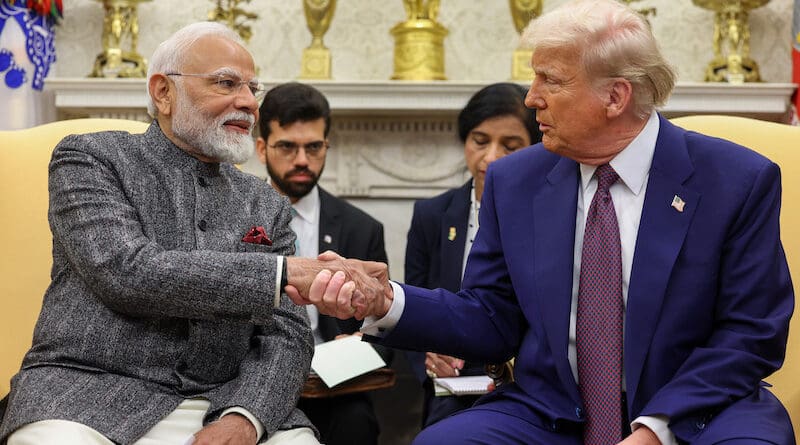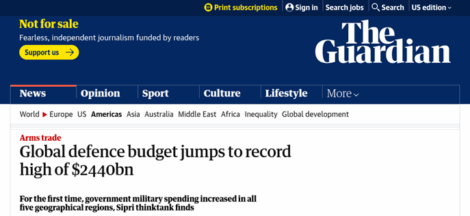By K Raveendran
Last week shattered any lingering illusions about the supposedly robust camaraderie between Prime Minister Narendra Modi and former U.S. President Donald Trump—a relationship that had been paraded for years as emblematic of India’s rise on the global stage.
The myth of a strategic friendship, carefully choreographed across Howdy Modi rallies and effusive public gestures, finally met its unceremonious demise when Trump hosted Pakistan’s army chief General Asim Munir and followed it up with a startling statement. In a tone that mixed condescension with calculated ambiguity, Trump declared that India and Pakistan had “very smart leaders” and credited them with maintaining a ceasefire between the two nations. On the surface, it seemed like a diplomatic nicety. But read between the lines and the subtext is a blow to New Delhi, particularly to Modi, who had invested significant political capital in cultivating the image of a special Trump-Modi bond.
The declaration left more questions than answers. Who exactly did Trump mean when he referred to the second “smart” leader from Pakistan? Was it the nominal Prime Minister Shehbaz Sharif, whose influence is widely regarded as secondary to the military establishment? Or was it General Asim Munir himself—the very man Trump had just hosted? Either interpretation is damning for Modi. If Trump equates Munir with Modi, he elevates a military official from a rival nation to the same pedestal as India’s elected leader. If it’s Shehbaz Sharif, then he is endorsing a figure propped up by Pakistan’s army in a political structure Modi has often derided as unstable and compromised. In either case, Modi comes out looking diminished, not just in comparison to Pakistan’s leadership but also in his perceived stature on the international stage.
This isn’t just a diplomatic slight—it’s a political farce. For years, Modi’s supporters showcased his relationship with Trump as evidence of India’s growing global clout. The image of the two leaders holding hands and waving to cheering crowds in Texas and Ahmedabad was supposed to cement Modi’s status as a global statesman, not just a regional power broker. “Abki Baar Trump Sarkar” was more than a slogan; it was an attempt to tether India’s fate to what was then the most powerful political brand in the world. It played well domestically, feeding into the narrative that Modi could talk to power as an equal. But the events of the past week strip away that veneer. Trump, in his typical fashion, has reminded the world that he doesn’t do friendship. He does transactions.
Trump’s affection is available for rent, not for keeps. The same man who once called Modi “a great man” and “India’s friend” had, in the very same breath during his presidency, also offered to mediate the Kashmir dispute without any request from India. He made it clear again and again that loyalty to any foreign leader or principle comes second to personal gain and strategic flexibility. So when Trump now praises Pakistan’s leadership—civil or military—it’s not because he’s had a change of heart. It’s because he sees something in it for himself. Whether it’s about reasserting America’s relevance in South Asia or simply playing to certain domestic constituencies, Trump is showing that he will pivot in a heartbeat if it helps Donald Trump.
For Modi, who has worked meticulously to build an image of strategic foresight and international gravitas, Trump’s remark is more than just an awkward moment. It is a public reminder that no matter how many hugs are exchanged or stadiums are filled, diplomacy under leaders like Trump is a high-wire act with no safety net. And India is not the only one to have learned this lesson the hard way. Traditional allies like Germany and France, not to mention NATO as a whole, have seen Trump flip positions, break promises, and issue threats without the slightest hesitation. His foreign policy style is not so much realist as it is opportunist, governed by the whims of ego and the exigencies of personal gain. In this light, Modi’s courtship of Trump looks less like strategic alignment and more like political theatre—one where the script was always being rewritten by one actor alone.
It’s also telling that the Indian government has maintained a conspicuous silence in the aftermath of Trump’s remarks. There has been no official response, no clarification, no behind-the-scenes briefing to temper the implications. This silence speaks volumes. Either New Delhi doesn’t know how to respond, or it is choosing to ignore the remark in the hope that it will be buried under the weight of the next news cycle. Both options are unflattering. For a government that has rarely missed a chance to project its assertiveness on the world stage, the lack of response is indicative of either a strategic miscalculation or an uncomfortable realisation: that the myth of Modi’s personal diplomacy is crumbling under the weight of reality.
This is not to say that India’s relationship with the United States is under threat. The Indo-U.S. strategic partnership is larger than any two individuals, and bipartisan consensus in Washington about India’s importance is unlikely to change drastically regardless of who sits in the Oval Office. But the personalisation of diplomacy—central to Modi’s foreign policy approach—now looks increasingly risky. It makes India vulnerable to the volatile personalities of foreign leaders, especially those like Trump who operate more on instinct than institution.
Furthermore, Trump’s endorsement—implicit or explicit—of Pakistan’s military is particularly galling in the Indian context. The Indian establishment has long held that the Pakistan Army is the root cause of instability in the region, the entity responsible for cross-border terrorism, and the puppet master pulling the strings of Islamabad’s fragile civilian governments. To see the same army’s chief hosted by a former U.S. president, and to hear him praised as a smart leader, is salt in a long-festering wound. It also complicates New Delhi’s messaging to the global community, where it has often sought to portray itself as the responsible actor in contrast to an erratic neighbour. Shashi Tharoor can make another half a dozen trips with the Modi mission, but this is not going to change a bit. (IPA Service)




